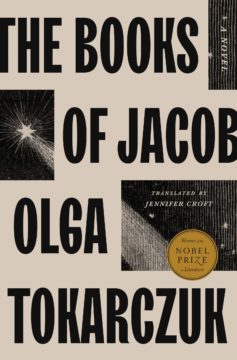Emma Levy in The Seattle Times:
 The Seattle Times chatted with Nobel Prize winner Olga Tokarczuk about her immersive, visionary 1,000-page novel that follows the extraordinary life of Jacob Frank, a Polish Jew who believed himself to be the Messiah and commanded a large religious movement in the 18th century.
The Seattle Times chatted with Nobel Prize winner Olga Tokarczuk about her immersive, visionary 1,000-page novel that follows the extraordinary life of Jacob Frank, a Polish Jew who believed himself to be the Messiah and commanded a large religious movement in the 18th century.
What did you see in the story of Jacob Frank? What do Jacob’s followers see in him?
Jacob Frank is a complicated character who escapes univocal judgment. His supporters remembered him as a handsome man while the opponents recalled an ugly hunchback. Nobody knows for certain what he was like, we can only guess. The controversy that surrounded him, and the enormous influence he held over people from all social classes has provoked me to fill in the blanks in his biography. His followers saw him not only as an inspired mentor but also as a chance to improve their social standing: most of the Frankists hailed from the small-time bourgeoisie of Podolia. Jacob might have been admired for his ascension above rules of society. This is a character in a state of perpetual transformation, especially after the trauma he endured in the Częstochowa prison. From an influential guide and leader to the masses, he turned into a cynical political player, driven by his own ambitions. He descended into hubris, became an emperor’s favorite and even an adviser to Maria Therese [ruler of the Habsburg Empire]. He stood above the law and his direct connection to divinity guaranteed that he would be obeyed.
More here.
